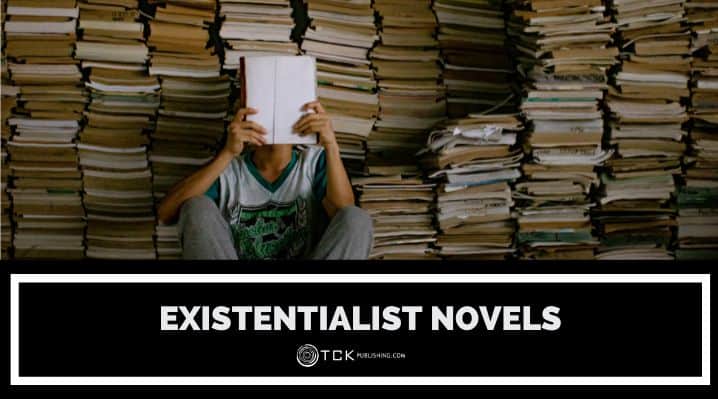
Existentialism is the philosophy of determining whether human existence has meaning, purpose, or value. Because in such a wide and complex universe, surely there’s an explanation for why we are here.
The best existentialist novels explore these possibilities, along with issues of absurdity, dread, and anxiety. Some laugh at the face of meaninglessness while others fear the crippling effects of existential crisis.
Best Existentialist Novels
Existentialist novels often involve characters who drown in the stillness of a pointless environment. They are forced to face themselves, and by their own free will, decide what their place is in the wider world.
1. The Stranger by Albert Camus
Meursault is involved in a senseless murder but is condemned more for his apparent lack of grief at his mother’s funeral. Divided into two parts, the book chronicles his thoughts and emotions before and after the murder.
2. Do Androids Dream of Electric Sheep? by Philip K. Dick
In the year 2021, Rick Deckard is a bounty hunter tasked to chase down artificial humans so realistic that they’ll pass off as the real thing. But his search leads to more questions—of his role in this world, the necessity of his work, and whether he even fits the definition of a human anymore.
3. Nausea by Jean-Paul Sartre
Antoine Roquentin is a French writer who undergoes a philosophical breakdown when writing the biography of the Marquis de Rollebon. He grapples with the absurdity of life, the meaningless of it, and the overpowering nausea of his existence.
4. The Trial by Franz Kafka
Josef K, a young, ordinary man, awakens one morning to find himself at the mercy of an absurd court system. He is never informed of the charges against him nor the crime he supposedly committed.
Throughout the novel, he navigates the nightmarish bureaucratic processes and encounters numerous bizarre situations. Questions about his purpose and his relationship to society arise as he defends himself against something he cannot understand.
5. The Violent Bear It Away by Flannery O’Connor
Believing it his divine mission, Mason Tarwater raises his orphaned nephew, Francis, to be a prophet. But with his great-uncle in his grave, Francis begins to resist the destiny forced upon him.
Meeting Rayber, a relative, introduces him to a more rational worldview. Faced with conflicting influences, Francis must choose his path forward, along with the consequences it contains.
6. Notes from Underground by Fyodor Dostoyevsky
The Underground Man is bitter, alienated, and disillusioned with society. He rejects the philosophies and conventions of his time, choosing to embrace his own irrational tendencies instead.
And yet, despite his disdain for society, he still craves human connection. He reflects on his life, his habit of self-sabotage, and the events that led him down his path.
7. Your Fathers, Where Are They? And the Prophets, Do They Live Forever? by Dave Eggers
Thomas’s psychotic breakdown leads him to take drastic steps in life. To make sense of his world and his pain, he resorts to kidnapping people and interrogating them.
He abducts people from his past, including an astronaut, an old high school teacher, and a congressman. He seeks to find meaning and truth within these interrogations, delving deep into how each person has shaped his life and society as a whole.
8. The Unbearable Lightness Of Being by Milan Kundera
Tomas, a doctor, struggles with his inability to commit. His wife, Tereza is consumed by his infidelity. Sabina, Tomas’s mistress, seeks freedom and emotional detachment. And yet her own partner, Franz, yearns for traditional values and commitment.
Set in a backdrop of social and political upheaval, all four find themselves entangled by the twists of faith, their own irrevocable choices, and the things they long for.
9. Invisible Man by Ralph Ellison
An unnamed African-American narrator from the South to Harlem, New York. There, he encounters social and political movements that begin to shape his life.
As he becomes more involved, he begins to realize society does not see him as him, but as a stereotype to be made into a symbol. And there starts his self-isolation from a world that has stolen away his visibility.
Determining your Purpose
What does your existence mean? Does your life even mean anything in the first place? As a conscious and rational being, thinking about your purpose and future is a normal part of life.
But with the universe so wide and life so complicated, there’s always that fear that our concepts of freedom, individual existence, and choice don’t mean anything in the grand scheme of things. This dilemma remains an important part of being human, provoking thought and action in an attempt to search for meaning in a seemingly indifferent universe.
What existentialist novels do you recommend? Share it in the comments below!
If you enjoyed this post, then you might also like:
- 12 Books about Reality and How You See the World
- 10 Mind Bending Books Like Inception
- 8 Books About Dreams and the Importance of Dreaming
- 10 Books About Trauma That Can Help You Heal

Cole is a blog writer and aspiring novelist. He has a degree in Communications and is an advocate of media and information literacy and responsible media practices. Aside from his interest in technology, crafts, and food, he’s also your typical science fiction and fantasy junkie, spending most of his free time reading through an ever-growing to-be-read list. It’s either that or procrastinating over actually writing his book. Wish him luck!
